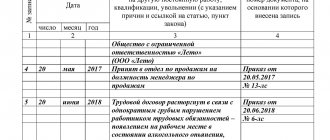Cassation proceedings are intended to verify the legality of a judicial act. A party to the case who considers the court order that has entered into legal force to be unfair and inconsistent with the true state of affairs has the right to file a corresponding complaint with the cassation court to cancel the court order.
ATTENTION : our lawyer for civil cases in Yekaterinburg will help you challenge a court order that has entered into legal force: professionally, on favorable terms and on time. Call today!
The procedure for appealing a court order in cassation
For individuals and legal entities who disagree with the court order, the procedure for filing a cassation appeal to the court will be approximately as follows:
- find a basis for filing a complaint. The purpose of cassation is to check the fairness and validity of the judicial act; therefore, to cancel the court order, a good reason will be required. The most common grounds for canceling a court order that has entered into legal force are the failure of a party, for good reason, to submit an objection to the creditor’s application to the court of first instance and failure to receive mail from the court due to an error in the debtor’s address;
- check the deadlines for filing a complaint. The court order comes into force ten days from the moment the party receives it, after which, within three months, a complaint can be filed in civil proceedings and within two months in arbitration;
- prepare and file a complaint to court. If there are grounds for filing a complaint and the deadlines are met, it can be stated in writing and sent to the cassation court;
- consideration of a cassation appeal in court. The legality of a judicial act is checked, as a rule, without calling the parties;
- get a ruling. The cassation court has the right to cancel the court order and send the case for a new trial, leave it in force or cancel it, indicating the need to go to court in the manner of claim proceedings.
Cancellation of a court order at the stage of enforcement proceedings. Practice.
One of the methods of debt collection provided for by procedural legislation is a court order. The procedure for issuing it and the conditions are defined in Chapter 11 of the Code of Civil Procedure of the Russian Federation. There is no need to give in detail the procedure and conditions for issuing a court order, since everything is quite clearly and clearly stated in Chapter 11 of the Code of Civil Procedure of the Russian Federation.
Meanwhile, in this publication, I will give a practical example of canceling a court order already at the stage of enforcement proceedings.
It is known that a court order is one of the most effective ways to collect various types of debts from citizens. This method has also gained popularity in the field of debt collection. This is explained by the fact that when considering an application for debt collection through writ proceedings:
— the statute of limitations does not apply, which allows the creditor to collect the debt outside the limitation period;
— there is no possibility to reduce the penalty accrued by the creditor, which ensures the creditor satisfaction of the maximum volume of stated claims;
— the amount of the state duty is 50% of the amount of the state duty payable in the general manner;
— the issuance of a court order is carried out within 5 days from the date of receipt of the application for the issuance of a court order to the court;
- a court order is issued without a trial and without summoning the parties to hear their explanations.
As you can see, Chapter 11 of the Code of Civil Procedure of the Russian Federation contains the most favorable and comfortable conditions for the creditor for collecting debt from its debtor.
After issuing a court order, the court is obliged to fulfill the requirements of Art. 128 of the Code of Civil Procedure of the Russian Federation, and equally, send a copy of the court order to the debtor. The debtor, in turn, has the right to bring his objections to the court order. In this case, the period during which the debtor can bring a court order is ten days from the date of receipt of the order.
The date of receipt of the court order by the debtor is the date of receipt of the court order at the post office, about which the debtor puts a receipt mark on the delivery notice. From this moment the established ten-day period for filing objections begins.
I know for sure that the majority of citizens not only do not control incoming correspondence, but also do not burden themselves with going to the post office even when they know that the corresponding correspondence has been sent to them. For example, after removing a postal notice from a mailbox, such notice is thrown away. But in vain.
The risk of lack of control over incoming correspondence and evasion of receiving it is that statements, notices, notices, demands or other legally significant messages with which the law or transaction associates civil consequences for another person entail such consequences for that person the moment of delivery of the corresponding message to him or his representative. A message is considered delivered in cases where it was received by the person to whom it was sent (addressee), but due to circumstances depending on him, was not delivered to him or the addressee did not familiarize himself with it (Article 165.1 of the Civil Code of the Russian Federation, clause 68 of the Resolution of the Plenum Supreme Court of the Russian Federation dated June 23, 2015 N 25 “On the application by courts of certain provisions of Section I of Part One of the Civil Code of the Russian Federation”).
According to paragraph 32 of the Resolution of the Plenum of the Supreme Court of the Russian Federation of December 27, 2016 No. 62 “On some issues of the application by courts of the provisions of the Civil Procedure Code of the Russian Federation and the Arbitration Procedural Code of the Russian Federation on writ proceedings” (hereinafter referred to as the Resolution of the Plenum), the beginning of the ten-day period for the application by the debtor objections regarding the execution of a court order (Article 128 of the Code of Civil Procedure of the Russian Federation, Part 3 of Article 229.5 of the Arbitration Procedure Code of the Russian Federation) is calculated from the day the debtor receives a copy of the court order on paper or from the date of expiration of the storage period for judicial mail correspondence established by postal organizations (for example, Federal State Unitary Enterprise " Russian Post" has established a seven-day storage period for postal correspondence).
This means that if the court sends a court order to the debtor, and the debtor does not receive it, the court, having received information about this, will issue a court order to the claimant, who in turn will enforce it, in particular, enforcement proceedings will be initiated on its basis .
As a rule, the debtor learns about the existence of initiated proceedings only at the stage of enforcement proceedings and after funds have been written off from the debtor’s bank account. The courts, in the overwhelming majority, formally treat the objections presented in such a situation, and leave the court order in force.
Case Study
My client also found himself in the above situation. Her relatives told her about the existence of the initiated enforcement proceedings, having learned about this fact through the bailiffs website. The amount of debt according to the issued court order was 258,166.32 rubles, of which the principal amount was 92,542.10 rubles, interest was 11,770.55 rubles, and the penalty was 150,977.22 rubles.
To provide qualified legal assistance, she turned to me. She explained that she had not received a court order and did not agree with the amount of the debt.
In this situation, I recommended that the principal immediately familiarize himself with the case materials in court, obtain a court order, and put a note in the file that the court order was received at the time of familiarization with the case. This is necessary, first of all, in order to record the date of actual receipt of the court order.
After receiving and studying primary documents, such as an application for issuing a court order, the court order itself, it became clear that it would be difficult to cancel it. The difficulty was that, firstly, as I wrote above, the court order in accordance with Art. 165.1 of the Civil Code of the Russian Federation, was considered to have been properly delivered to the principal, and therefore, to submit objections for its cancellation according to the rules of Art. 129 of the Code of Civil Procedure of the Russian Federation was not possible.
However, upon closer examination of the circumstances of the case, I found out that the organization engaged in the delivery of correspondence violated the rules and conditions for the delivery of correspondence. Such a violation may prove the fact that the debtor did not receive a court order due to the fault of the postal organization.
Indeed, violation of the rules for the delivery of correspondence on the part of a postal organization is a serious basis for raising the question of canceling the court order.
Thus, in paragraph 33 of the Resolution of the Plenum of the Supreme Court of the Russian Federation dated December 27, 2016 No. 62 “On some issues of the application by courts of the provisions of the Civil Procedure Code of the Russian Federation and the Arbitration Procedural Code of the Russian Federation on writ proceedings” (hereinafter referred to as the Resolution of the Plenum) it is stated that in case of omission ten-day period for submitting objections regarding the execution of a court order, the debtor has the right to submit objections regarding the execution of a court order even outside the specified period, justifying the impossibility of submitting objections within the established period for reasons beyond his control (Part 5 of Article 229.5 of the Arbitration Procedure Code of the Russian Federation).
In accordance with paragraph 34 of the Resolution of the Plenum, the debtor’s objections sent outside the established period must be accompanied by documents confirming the impossibility of submitting objections within the established period for reasons beyond the control of the debtor.
Such evidence may include documents refuting information from the official website of the Federal State Unitary Enterprise "Russian Post", which was accepted by a magistrate or arbitration court as evidence that the debtor can be considered to have received a copy of the court order; documents confirming the debtor’s failure to receive a copy of the court order in connection with violation of the rules for the delivery of postal correspondence; documents confirming that the debtor-citizen has not received a copy of the court order due to his absence from his place of residence, including due to illness, being on a business trip, vacation, in connection with moving to another place of residence, etc.
Thus, based on the explanations given in the Resolution of the Plenum, a court order can be canceled by the court based on the raised objections and outside the period established for filing objections. At the same time, the debtor is obliged to provide evidence that the court order was not received under circumstances beyond his control.
The basis for canceling the court order in our case, in my opinion, was the fact that the company delivering postal items violated the rules for their delivery. Since this company does not have its own rules and conditions for the delivery of postal items, I was guided by Order No. 423-p dated December 5, 2014 “On approval of Special Conditions for the Reception, Delivery, Storage and Return of Postal Items of the “Judicial” category, which regulate the procedure for acceptance, delivery , storage and return of postal items of the “Judicial” category in federal postal facilities and are mandatory for execution by branches of the Federal State Unitary Enterprise “Russian Post”.
Thus, in paragraph 3.2 of the said Rules it is written that registered letters and parcels of the “Judicial” category are delivered to the address indicated on the postal item and are handed over personally to the addressee (or his authorized representative) against a receipt in the notice f. 22 upon presentation of one of the documents specified in the appendix to these Special Conditions.
According to clause 3.3 of the Rules, in the absence of an addressee, such letters and parcels can be delivered to adults living with the addressee without a power of attorney, upon presentation of one of the documents specified in the Appendix to these Special Conditions. At the same time, in the notification of delivery of the registered postal item f. 119 and in the notice f. 22 indicates the person to whom the “Judicial” item was delivered, with appropriate notes on the degree of relationship. If the addressee is not at home, a notice f. is left in the subscriber's mailbox or in the post office box. 22 with an invitation to the addressee to a postal facility to receive a postal item.
According to clause 3.4 of the Rules, if the recipients fail to appear for postal items of the “Judicial” category, within 3 working days after delivery of the primary notices, secondary notices f. 22-v.
If it is impossible to serve the notice f. 22-in, against receipt, it is lowered into the cell of the subscriber's mailbox, postal subscription boxes, while on the tear-off part of the notice an o is written, the date is affixed, and the signature of the postal worker.
From the information posted on the official website of the postal company, it follows that both attempts to deliver the postal notice/item were made on the same day, namely November 17, 2017, while the Rules provide that secondary notices are delivered and handed over only after 3 (three) days after the initial notification (clause 3.4 of the Rules)
On the same day, that is, November 17, 2017, the notification had already arrived by mail, as evidenced by the fact that the notification was assigned the status “in processing.” This means that the notice was not actually dropped into the mailbox, and if it was the item itself, it was not handed over properly, but immediately, that is, on November 17, 2017, it was sent for processing to send the postal item back to the sender.
This violation, in my opinion, was significant and resulted in the loss of the debtor’s ability to receive postal items and, consequently, to raise objections to the court order within the period established by procedural law.
I also drew the court’s attention to the fact that, in violation of clause 3.4. Rules, on the tear-off part of the registered notice there is no o, as well as the date and signature of the postal worker, including other information that makes it possible to reliably establish attempts to deliver the postal notice/item.
To strengthen my position, I cited the fact that my principal is an individual entrepreneur and regularly receives documentation related to business activities by mail, in connection with which I submitted copies of tax inspection notices on tax payment to the case materials, as well as a copy of the resolution in the case of an administrative offense. These documents, even if indirectly, confirmed the fact that my principal monitors incoming correspondence and always receives it when it arrives.
I considered it necessary to read reviews about the work of the postal company on the Internet, and found out that most citizens are dissatisfied with the work of the company, and accordingly, I included these reviews in the case materials as evidence of possible negligence in the performance of duties for delivering correspondence.
The court, having considered the objection to the court order, issued a ruling to cancel it, which my client was happy about.
How to file a cassation appeal against a court order?
When drawing up a cassation appeal, compliance with the written form is required (the document can be submitted in printed, handwritten or electronic form), as well as certain features of the content.
The header of the application should indicate:
- the name of the court to which the complaint is filed;
- participants in the case and their procedural position (plaintiff, defendant, third party);
- other persons interested in the outcome of the case;
- identifying characteristics of the parties (telephone numbers, address of location or residence, etc.);
- number of the appealed judicial act;
- information about payment of state duty.
The content of the complaint consists of arguments on the basis of which the cassation court should cancel the court order of the lower court. Such arguments include incorrect interpretation of the law in the first instance, non-application of any rule of law, consideration of the case in an illegal composition, and others. The arguments of the submitted application will be more convincing if supported by references to the rules of law and case sheets, as well as judicial practice indicating the numbers of similar cases.
In the pleading part, the applicant succinctly formulates why he is actually sending the complaint - a request to cancel the court order.
At the end of the document, after the list of attachments, the applicant puts his signature and the date of filing the complaint.
USEFUL : order an appeal against a court decision with the help of our Ekaterinburg lawyer right now
How to correctly draw up an application to cancel a court order?
An application to cancel a court order is submitted (in person, through an authorized representative or by mail) to the court body that issued the decision.
The law does not provide for specific requirements for drawing up an application to cancel a court order, but, based on established judicial practice, certain rules must be followed when writing an objection.
The application is made in simple written form - by hand or printed.
- In the upper right corner you should indicate:
- name of the judicial body, surname and initials of the judge;
- surname and initials, registration address (place of residence), telephone number of the applicant.
- Below, in the center of the sheet, the name of the document is written: “Objection.”
- In the main part, the applicant sets out his reasoned disagreement with the court order, indicating the reasons. (This condition is not mandatory).
- The pleading part must express an appeal to the court - a request to cancel the court decision.
- Next, the date is indicated and a personal signature is placed.
How and where to file a cassation appeal to challenge a court order?
A cassation appeal against a court order can be filed personally or through a representative with appropriate authority.
In arbitration proceedings, the applicant is obliged to send copies of documents to the parties participating in the case; in civil proceedings, the complaint is filed with the court in a number of copies equal to the number of parties. One copy of the application will be required for the court itself. The application intended for court must be accompanied by the original receipt for payment of the state duty or documents indicating exemption from it. Mandatory documents also include a copy of the contested court order. The remaining documents are attached either if necessary (power of attorney of the representative, information about sending a copy of the complaint to other participants in the case), or at the discretion of the applicant (judicial practice in similar cases).
A cassation appeal within the framework of civil proceedings is sent through the court that issued the court order to one of nine cassation courts of general jurisdiction, depending on the judicial cassation district. In the arbitration process, such statements are sent to the cassation court according to the general rules of jurisdiction.
A cassation appeal can be submitted personally to the office of the court of first instance, sent by registered mail, as well as electronically by filling out a special form on the court’s website (if such a possibility is provided by the website) or through the Internet portals of the State Automated System “Justice” or “My Arbitrator”.
Provisions for the settlement of disputes between the claimant and the debtor
Article 129 of the Civil Procedure Code of the Russian Federation contains information on how a dispute over the recovery of property between the parties should be regulated.
Even if the debtor's arguments to the judge about the order are absurd, the judge must still cancel the court order. The debtor's justified demands for this may not be useful for cancellation.
The court is obliged to assess the controversial situation between the debtor and the claimant if there are objections from the former, even if they are not motivated. There may be a situation of litigation in the case.
If the court order is canceled in accordance with Article 129 of the Civil Procedure Code of the Russian Federation, the plaintiff has the opportunity to file a claim for the return of funds for the debt arising from the bill of exchange obligation. The claim is filed, depending on the subject component, according to judicial jurisdiction, in courts of general jurisdiction or in arbitration.
This is important to know: Limitation period under a loan agreement: judicial practice in 2021
If the debtor objects to something, the judge is required to make a judicial decision to cancel the earlier order. The judge is obliged to explain to the claimant his ability to bring claims according to the general rules. Copies of the ruling to cancel the court order are sent to the parties no less than three days from the date of adoption of such a ruling.
Further, when the debtor has already received a sent copy of the judge’s order, the court undertakes to provide the same copy to the claimant or cancels the order. It is canceled in accordance with the instructions of Article 129 of the Civil Procedure Code of the Russian Federation.
It is unrealistic to file a complaint against a court order in the court of appeal, since there is a separate procedure that provides the debtor with certain guarantees. So, if the debtor raises his objections to the court order, the judge, in accordance with the rules of law, must cancel the order. This occurs even in cases where the claims are legitimately unsubstantiated. However, this does not prejudice the rights of the claimant, who can also file a claim. Only in this case the debtor has the right to defer the participation of the dispute.
The judicial process in appeal, cassation and supervision does not verify the court order. In these instances, it refers to requirements that do not have a dispute about law. Its legality is not verified in writ proceedings. The timing of the trial is subject to the rules of Articles 107 and 108 of the Civil Procedure Code of the Russian Federation.
Attention! Our qualified lawyers will assist you free of charge and around the clock on any issues. Find out more here.
Restoring the deadline for filing a cassation appeal against the cancellation of a court order
A person who has missed the deadline for filing a cassation appeal against the cancellation of a court order has the right to restore it if there are good reasons. It should be noted that the deadline for filing a cassation appeal in civil proceedings can only be restored in exceptional cases. These may include, for example, the applicant’s serious illness or his being in a helpless state. According to Article 112 of the Code of Civil Procedure of the Russian Federation, these exceptional circumstances must occur within a period no later than one year from the date of entry into force of the judicial act.
In the arbitration process, such an application can be filed within six months after the court order enters into legal force or from the moment when the person learned of the violation of his rights by this order.
A petition to restore the missed deadline for filing a cassation appeal against the cancellation of a court order is sent to the cassation court. It can be filed simultaneously with the complaint itself. It is also permissible in the text of the complaint itself to file a petition to restore the procedural period. The court considers this application without summoning the parties. The result of consideration of the application for restoration of the missed deadline will be a court decision to restore the deadline for filing a cassation appeal or to refuse restoration.
USEFUL : read about the restoration of deadlines in the process using the link on our website
Petition for restoration of time limit
In a petition to restore the deadline for filing an objection regarding the execution of a court order and, accordingly, an objection regarding the execution of an order, you must indicate when and under what circumstances you became aware that a court order had been issued against you.
For example, “I learned about the existence of a court order that had already entered into force on December 10, 2021 in connection with the initiation of enforcement proceedings against me. This circumstance came as a complete surprise to me.”
Next, it is necessary to justify the circumstance of the impossibility of filing an objection regarding the execution of the court order within the prescribed period.
In accordance with paragraph 30 of the resolution of the Plenum of the Supreme Court dated December 27, 2021 No. 62 “On some issues of application by courts of the provisions of the Civil Procedure Code of the Russian Federation and the Arbitration Procedural Code of the Russian Federation on writ proceedings,” the debtor is considered to have received a copy of the court order if the magistrate, the arbitration court has evidence of delivery to him of a copy of the court order, sent by registered mail with acknowledgment of delivery (part one of article 113 of the Code of Civil Procedure of the Russian Federation, part 1 of article 122 of the Code of Arbitration Procedure of the Russian Federation).
According to paragraph 34 of this resolution, the debtor’s objections sent outside the established period must be accompanied by documents confirming the impossibility of submitting objections within the established period for reasons beyond the debtor’s control.
Such evidence may include:
- documents refuting information from the official website of the Federal State Unitary Enterprise "Russian Post", which was accepted by the magistrate, arbitration court as evidence that the debtor can be considered to have received a copy of the court order;
- documents confirming the debtor’s failure to receive a copy of the court order in connection with violation of the rules for the delivery of postal correspondence;
- documents confirming that the debtor-citizen has not received a copy of the court order due to his absence from his place of residence, including due to illness, being on a business trip, vacation, in connection with moving to another place of residence, etc.
The most common case and, accordingly, the basis for reinstating the deadline for filing an objection regarding the execution of a court order is a violation of the rules for the delivery of postal correspondence.
As mentioned above, when reading the case materials, you should receive a 14-digit track number. We go to the official website of Russian Post JSC on the Internet information and telecommunications network, enter the specified number and receive a tracking report on the shipment.
Having studied the contents of this report, it is necessary to check compliance with the procedure for receiving and delivering internal registered mail (the procedure was approved by Order of the Federal State Unitary Enterprise “Russian Post” dated 03/07/2019 No. 98-p) when delivering a court order to you, namely:
Clause 10.3.3 of the procedure provides that letters received at the post office before 14-00 local time and to be delivered to your home must be delivered on the day of receipt.
However, this requirement is often violated, and letters are delivered to the addressee the next day after they are received by the OPS, or even after 2 days.
Clause 11.1 of the procedure states that postal items of the “Judicial” category, if it is impossible to deliver them to the addressees (their authorized representatives), are stored in the postal facilities of the destination for 7 days.
This correspondence storage period is also not always observed.
Now pay special attention to clause 10.3.5 of the procedure, which stipulates that while moving along the delivery section, the postman delivers postal items to the addresses indicated on them and delivers them to the addressees (authorized representatives). If it is impossible to deliver the registered mail item, notices f. 22 (f. 22-o, f. 22/119) in the cells of subscriber mail cabinets (postal mailboxes). The postman records the date and time of these actions in the report on the results of delivery of correspondence.
However, you will not find information about the date and time that the specified notice was left on the shipment tracking report.
Accordingly, there is no evidence that notice was left to you, which means that the court order was not received due to circumstances beyond your control.
Additionally, on your package tracking report, also note the date and time of the “mail delivery failure.” Perhaps on this day and time you were at home, which can be confirmed by one of your relatives, spouse or person with whom you are related. In this case, it is necessary to apply for a witness to be summoned to the court hearing.
Moreover, often in the shipment tracking report there is no information about the attempt to serve court correspondence at all, which is also the basis for reinstating the deadline for filing an objection to the execution of the court order.
Also pay attention to the order of the Federal State Unitary Enterprise “Russian Post” dated December 5, 2014 No. 423-p “On approval of Special Conditions for the acceptance, delivery, storage and return of postal items of the “Judicial” category (valid until March 6, 2021).
According to this order, registered letters and parcels of the “Judicial” category are delivered to the address indicated on the postal item and handed over personally to the addressee (or his authorized representative). If the addressee is not at home, a notice f. is left in the subscriber's mailbox or in the post office box. 22 with an invitation to the addressee to a postal facility to receive a postal item.
If recipients fail to appear for postal items of the “Judicial” category within 3 working days after delivery of the primary notices, secondary notices are delivered to them and handed over against receipt.
However, as a rule, delivery and service of secondary notices were not carried out.









